Comrades of the FreeTheRöszke11-Solidarity-Campaign from Ljubljana produced a video about the last trial-dates against Ahmed in Szeged. You can find the video on Komunal.org.

Comrades of the FreeTheRöszke11-Solidarity-Campaign from Ljubljana produced a video about the last trial-dates against Ahmed in Szeged. You can find the video on Komunal.org.
The situation in Serbia and Belgrade in terms of migration and refugees
– A report from January 2018 –
In the year of 2015 – as consequence to the so called long summer of migration – thousand of people filled public places in Belgrade, the capital of Serbia. Empty buildings were occupied for collective housing and as protection against the cold. Parks were used for sleeping and spending the waiting time until a new possibility to continue the journey to the north shows up.
Nowadays, the parks are empty again, squatted halls or bulidings have been evicted or demolished – mainly in spring 2017. Most of the refugees have been brought to camps outside Belgrade. Also the camp in the southern village of Preŝevo still exists. Within the context of the statewise organized corridor in 2015 and 2016 this camp was used as a transit camp to register people on the move. Back then, the situation was a humanitarian catastrophy. Now, according to activists, it appears like an open prison, where around 1000 people are being kept for months. It seems to be hard to leave this camp as public transportation (is forced to) deny taking refugees in direction to Belgrade althought they already entered and registered in Serbia. This opens up a profitable market for mafia-close structures or traffickers to take heaps of money to drive refugees by car or taxi to the desired places – as there is no other option. More over, the police enters the camp on a regular base to demand people to leave „volontarily“ back to Macedonia, it is a cynical form of push-backs. Indeed, people obviously leave back to Macedonia due to better chances to cross the border again with the aid of traffickers without ending up in Preŝevo.
Hungary‘s migration policies make it almost impossible to cross the border from Serbia to Hungary (EU) without being caught by border police or violent border hunters and being arrested, imprisoned or pushed back. So now people try to pass into the North via Croatia. Recently, some hundreds of people on the move got stuck in Sid, at the border crossing from Serbia to Croatia. They built up so called wild camps and protested against the harsh border regime. The response to this protest was the forced encampment of people claiming their right to move. The role of Serbia, but also of Macedonia and Croatia, becomes more and more clear. They function as a buffer zone towards the EU, especially considering the fact that the majority of refugees do not want to stay in these contries, but rather cross them on their way to Northern European states.
In general, the invisibilization of refugees and migration in publicity can be noticed by isolation and imprisonment of the people on the move.
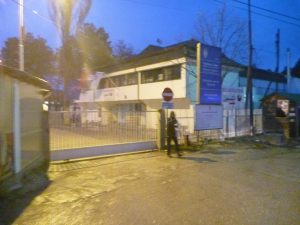
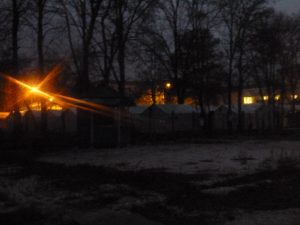
Interview with an activist who works with refugees in Belgrade
The interview was made by german activists from the anti-repression campaign You cant evict Solidarity from Germany. Beside many conversations with serbian NoBorder-activists, the following interview was made via email.
Today in Serbia there are about 4000 to 5000 refugees, mostly living in 18 camps scattered all over the country. About 500 live outside of the official centres in informal settlements. Whether in the so called “jungles” at the border with Hungary or in dismissed factories like in Sid, at the Serbian-Croatien border or in abandoned buildings in Belgrade. They have very limited or no access to main needs, such as water and sanitation. But also whether in or outside of official camps, they live in constant precarity.
The option of requesting asylum in Serbia remain sporadic and very limited. In 2017 only 3 persons received refugees status in the country, the rest have been rejected, but the most do not even manage to apply for asylum because legal and administrative support is very poor and not available in all different camps.
Which (refugee) camps play an important role in this country?
Presevo (Serbian-Macedonian border): The entry point at the border with Macedonia remains under special administration of the Ministry of Labour. Implementing a restrictive regime on the freedom of movement, it is perceived mostly as an open prison by most of refugees. On the contrary, living conditions and access to certain services are better than in other camps.
Obrenovac/Krnjaca (Camp in the South of Belgrade): This camp is identified respectively as camp for single young men and for children under 15 years, which means for unaccompanied minors.
These two camps, both not far from Belgrade, are considered as the main hubs for finding a way out from Serbia. The security and living conditions have deteriorated from last summer. There are gangs and people living in the camps reported several incidents, which are only resolved with violence or harassment by police or KIRS (Commisariat for refugees and migration) employees.
Serbia used to be a transit country and now became a place where people remain trapped. Stuck and left alone, they are pushed to take higher risks to find a way out. In 2015 Serbia was just another country to stop by and continue along the route, today it is still a very important crossing point but can be a dead end, from where it seems impossible to leave.
I can talk about the public political discourse in Serbia, which after 2016 shifts closer and closer to the V4 countries (Visegrád Countries: Hungary, Slowakia, Czeck Republick and Poland). You can recognize more xenophobia, more discrimination, but at the same time Serbia is trying to remain faithful to the EU and not openly joining the V4, because Serbia must enter into the EU market as soon as possible.
Criminalisation of solidarity remains very high, but more subtile and invisible compared to 2016 when the government published an open letter forbidding different organisations to provide food in the city centre.
It is painful but rewarding. However, from the emergency phase we are now in a different stage of the political and humanitarian response. In other words money is going directly to the Ministries and not the NGO sector. This creates a big lack of checks and balances resulting in a deterioration of access to basic services. But also it legitimates the Serbian government politics and more widely the EU policies of exclusion and discrimination, by which it is better to have thousands of people outside of the EU-border rather than including them within the EU asylum system.
There are several organisations which remain active but the individuals and self – organised response has been shrinking after more than 2 years of engagement. There is a need of finding new narratives, new struggles because the context has changed and today in Serbia as well as in other European countries, the main issue remains integration, access to services such as rights but also housing, education and work.
What we see in Sebia continues to reflect more complex regional dynamics by which the negative effects of the EU migration policies are clearly visible at the external EU borders. Such as the constant use of violence as deterrence at the border, the strategy of encampment, the deterioration of political discourses which continue to legitimize xenophobia and securitisation rather than inclusion as well as clear and safe access.
Still in Solidarity!
Report on the anti-repression campaign “ You Can’t Evict Solidarity” and perspectives on solidarity work on the “Balkanroute” in January 2018
The campaign “You Can’t Evict Solidarity” is made up of different people living in Germany and Greece who are active in anti-racist and other political struggles. Many of them were active on the Balkanroute, in Greece or on the outer borders of the European Union in the past 2 ½ years. They started the campaign in the summer of 2016 to promote solidarity beyond borders with (migrants’) squats and housing struggles in Greece and everywhere.
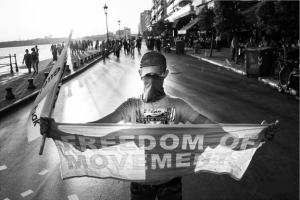
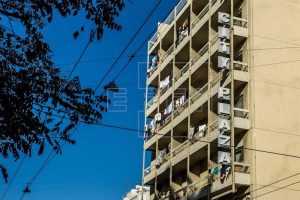
Start of the Campaign in Summer 2016
In July 2016, the Syriza government and the Greek church evicted the three squats “Orfanotrofeio”, “Nikis”, and “Hurriya” in Thessaloniki, Greece, that were established and inhabited by migrants and activists. During the evictions and at protests following in the next days, more than 100 people were arrested. Many migrants previously living in the squats were brought to military camps.
Several days after, in July and August, 2016, the first were convicted with high fines and probational jail sentences. Many of the people involved in the “Can’t Evict Solidarity” campaign were at No Border Camp Thessaloniki, which had happened previous to the evictions. After first meeting there, we got together again afterwards and decided together with people affected by the evictions to collect money for the oncoming legal costs, to raise awareness for the evictions, and continue supporting migrant housing struggles. One of the goals of the campaign is therefore to support the creation of other spaces of solidarity and communal life in other places. The importance of this is shown as well by the recent cases of repressions against the solidarity movement in Greece.
What has since happened in Greece…
While the situation for refugees in Greece has overall become worse in the past years and the situation of people living in Greece is marked by the inhuman austerity policy of the EU, 60.000 migrants are stuck there after the militarisation and closing of the Balkanroute. The migration policy of the EU with the EU-Turkey deal and the Greek Syriza government force continuous militarisation and repression against refugees and activists. The crowded camps in Greece usually lack primary health care, food, and sanitary devices. Many camps are situated in remote, former industrial areas, or are made up of tents. Add to this the brutal treatment by police, military, and private security.
Meanwhile, many camps simply resemble prisons. Especially striking are the so-called “Hot-Spots” on the islands of Chios, Lesbos, and Samos, that the EU-Turkey deal turned into a dead end for refugees. Currently, over 15.000 people are stuck on the islands – more than 8.000 have to live under inhumane conditions in Camp Moria on Lesbos, which was constructed for 1.500 people. Again and again, people trapped there have protested with hunger strikes against the conditions in these “open prisons” and demanded the right to move. Most of the protests were stopped violently, the protestors were imprisoned for months or deported. Currently the Petrou Ralli 8 or the Moria 35 are two of such cases, that we are in solidarity with.
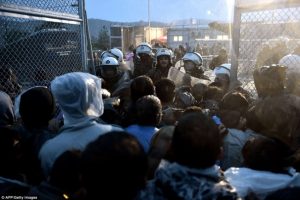
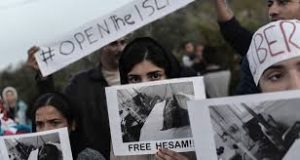
In response to these circumstances, houses are squatted not just in Thessaloniki, but also in Athens, other greek cities and on the islands to create the possibility for a self-determined life for refugees and other activists, as an alternative to state-run camps, state violence, and beyond sexist, racist, and nationalist categories. The houses provide spaces for political networking, self-organisation against the EU border regime, and enable solidarity and mutual support, also of the greek society. They present effective alternatives to state and capitalist backlash.
The most well known of these squat would be the former “City Plaza” Hotel in Athens, that since 2015 is home to a community over 400 people living together in solidarity. There are several of these free spaces here in Germany and along the Balkanroute as well, like the OM10 in Göttingen, Germany, or the formerly squatted warehouses in Belgrade, Serbia.
Instead of improving the inhumane conditions refugees have to endure, the Greek government continues their strategy of repression in, a desperate attempt to smash the powerful international solidarity movement. Several times, the government gave order to evict squats on Lesbos, then the refugee squat “Alkiviadou” and the squat “Villa Zografou” in Athens in March 2017, arresting 200 people who lived there. All of this under the instruction of Nikos Toskas, the Greek minister for public order, who wants to speed up the eviction of squats used to house refugees, suggesting a threat to further spaces such as the “City Plaza”. In April, the eviction of a further solidarity squat, the “Albatros”, which was started after the evictions in the summer of 2016, followed in Thessaloniki. Alongside all of the evictions, protests were happening in Greece as well as other countries, sometimes with thousands of participants.
And what is happening along the Balkanroute?
Generally, we’re seeing an increase of repression against refugees and migrants, against supporters, and against alternatives to state-controlled migration policy not just in Greece but everywhere in Europe. This was the case already before the “summer of migration” in 2015, but now the borders between the Balkan states, most prominently the Serbian-Hungarian border, are heavily militarised. Equipped with modern surveillance technology, police and military track refugees, forcefully stop them from crossing the borders, and sometimes unlawfully incarcerated for months. At times, refugees are shot, what happened at the border between Bulgaria and Turkey.
In parallel, repression against refugees has increased in the courtrooms, as in the case of Ahmed H., who was arrested alongside eleven other refugees in Röszke, Hungary, in September 2015 (the “Röske 11”), and in November 2016 was sentenced to 10 years in prison. He and the others were randomly taken out of a crowd protesting at the Serbian-Hungarian border and convicted of terrorism and illegal border-crossing. Even though the sentence was contested at a higher court level, Ahmed remains under arrest and is waiting for his appeal, which is expected for March 2018.
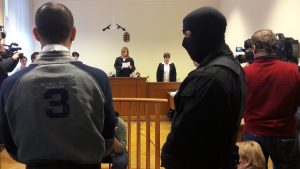
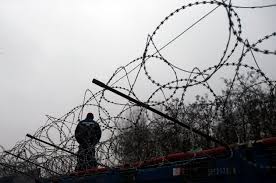
Still, many people are taking this dangerous route and in turn get stuck in the so-called “hotspots” on the Greek islands or mainly in Serbia, live on the streets or are illegally deported. Houses squatted out of necessity are evicted, such as the warehouses in Belgrade in the spring of 2017, and activists working in solidarity are arrested as traffickers, as in Croatia in the fall of 2016. Because of the militarisation of the borders and the criminalisation of support for refugees through new laws, e.g. long prison sentences for “human trafficking”, it became almost impossible for activists to directly aid people on their way.
However, resistance is still visible. Again and again, refugees are protesting against these conditions and for open borders and their right to move. In 2016, a protest march from Belgrade to the Croatian Border took place, and just last December, a protest camp was established by refugees at the Serbian-Croatian border near Sid. Most of the time, these acts of resistance are quickly brought to an end by police and military, and the protesters spread across state-controlled camps all over the country.
What did we do to support the resistance and what is currently happening?
The campaign was started in the fall of 2016 and got a lot of support through people organising solidarity parties in many cities, donating money, and raising public awareness. Several thousand Euros were collected already and sent to people affected by repression in Greece. Money was spent to pay lawyers and legal fees, and for publicity around these issues (leaflets, stickers, posters).
In Thessaloniki, the first convictions of the squatters of “Nikis” in July 2016 were followed in 2017 by court dates for the 82 activists of the “Hurriya” and “Orfanotrofeio” squats. The “Orfanotrofeio” activists had been accused of “disturbing the peace of the church” because of an action happening during a ceremony but were cleared of all charges in the appeal trial, and in addition, five further squatters of the “Orfanotrofeio” were cleared of all charges on May 31. The trial against the 58 squatters of “Hurriya” was postponed already several times and is now set for September 2018. In December 2017, all nine squatters of “Albatros” were convicted to 6 month in prison on probation for 3 years, they are now appealing this decision.
We accompanied all of these trials with reporting and otherwise, and supported also people affected by new cases of repression. In addition, several people are facing charges after the evictions of “Alkiviadou” and “Villa Zografou” squats in Athens. We also financially supported the “Steki” social center for migrants in Thessaloniki, that while not being a squat, was endangered by closing through the Greek state, and the squatters of the “Turtle Corner” squat in Thessaloniki, who were convicted after the eviction that already happened in the spring of 2016. At the same time, the current developments in Greece and the ongoing court cases show that the campaign remains necessary and that we have to continue to organise solidarity and support.
What does the future of the campaign look like?
We met in December 2017 to discuss the (re)orientation of the campaign. Since state repression against refugees increases all along the Balkanroute and the outer EU borders, not just in Greece and not stopping at borders, and since there are simultaneous big solidarity networks across all borders, we will expand the campaign. The money collected so far will be used to support the remaining trials and people not yet convicted in Greece, and to enable publicity work. We want to increase international anti-repression work to support people struggling in anti-racist issues at the EU-borders. We want to raise awareness for their struggles and call for donations. People in need of support, as well as people interested in helping with the campaign are invited to contact us!
More information on the campaign and possibilities to get in contact can be found online at
https://cantevictsolidarity.noblogs.org/ (German) and
https://cantevictsolidarityenglish.noblogs.org/ (English).
Rote Hilfe e.V./ OG Hannover
IBAN: DE42 4306 0967 4007 2383 57
BIC: GENODEM1GLS
Reason for Payment: Cant evict Solidarity
YOU CAN’T EVICT A MOVEMENT – YOU CAN’T EVICT SOLIDARITY!